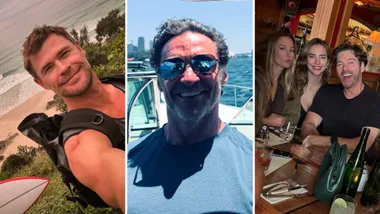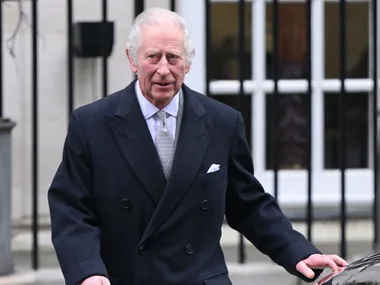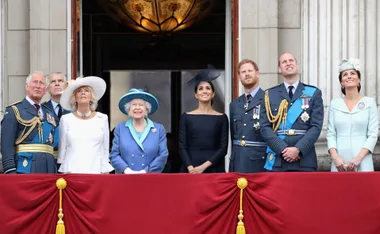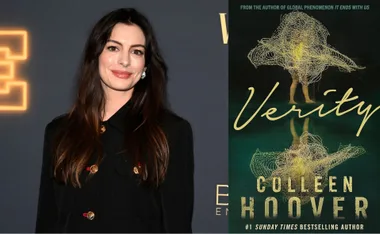Author of our August Great Read, Wives and Lovers.
**Q How has the book been received in the UK?
A** It was published a week ago and we’ve had a lot of interest. It came out in hardback and it’s in all the bookshops and getting very good review coverage. Which is fantastic and surprising, because I’m a first-time author and it’s not always easy to get a book off the ground. The publisher has been great, they’re 100% behind it.
**Q You’re obviously hopeful the publication of your debut novel is the beginning of a long and successful writing career?
A** I’m working on the second book at the moment which isn’t a sequel to Wives and Lovers, although some of the minor characters do re-appear. They are minor characters in Wives and Lovers but, in the second book, they are main characters. So it’s the same setting, same type of location, but different theme. I feel very driven to write a second book.
**Q I think a lot of women will relate to Wives and Lovers and it’s theme of modern marriage – what drew you to it?
A** I’m 37 now and I guess I’m at a stage in my life where most of my friends are married, building up their families but I also have a number of friends who are in their forties and starting to struggle and in some cases separate and divorce. It’s that time of life. So it’s something that I saw going on around me. And I’ve seen it from both sides of the fence because I’ve been a single parent, like the character Annie in the book, but I’ve also been married. And I’m aware of the kind of thing that the grass is always greener on the other side of the fence. The girls who are single, envy their married friends. The married girls envy their single friends and I wanted to look at that and see, what is the reality? What are the advantages? To some extent, even though the characters David and Victoria have what you’d call a bad marriage, there is still some companionship, some shared activity although their quality of life together is very low. Whereas with Clara and Tom, she is very dissatisfied. There’s a lot of dullness there. But she goes back to that companionship even though there isn’t the excitement. I wanted to look at all of that and see what it is that keeps couples together in a long term relationship?
**Q Did you come to any conclusion or do you have any answers?
A I would NOT** set myself up as having answers for anyone. Although it may sound clichéd, I think trying to reach some acceptance of where you are at the time. I think the idea that if you have an affair, or if you change your partner, or if you move to another part of the country then your life is going to magically improve is very corrosive. You still take yourself with you and I think it’s important to have that acceptance of where you are now. And I think that’s what stage Victoria reaches, because she’s in complete denial about the state of her marriage and one day she has to say, ‘Well, what’s the reality?’ I suppose it is taking a long hard look at where you are and seeing whether you can work it out from that point.
**Q I think, too, your story says that it takes a lot of courage to end even an unhappy marriage?
A** That is really important. When Clara and Victoria have that argument and Clara says, ‘Why don’t you just leave?’, it’s probably a question we’ve all asked about our friends either directly of them or indirectly in our own mind. If you’re unhappy why don’t you leave? These days it’s not that easy. I suppose I wanted to make a point too in that argument between the sisters, that we don’t ever really understand the true dynamics of other peoples’ relationships. It’s very easy to give advice, but it’s tough to actually carry that out. And Victoria has a lot of fear. She’s looking out thinking, ‘Well, do I really want to be on the dating scene again?’ That’s the thing I hear a lot of. Women who are dissatisfied in their marriage but think it’s a very scary place out there.
**Q You’re single again, aren’t you? So how are you finding the dating scene?
A** This is going to be in my second book, too. I find it incredibly difficult. Going through that process. I’m pretty positive. I think you’ve got to go out there, be not too heavy about things, be fairly light-hearted and see what happens. I think if you come out of a marriage thinking, ‘hopefully, soon, I’m going to find the love of my life’, you might be disappointed. But if you go out and do all the standard things, building up your network, your social life, going out with your friends, then I think that’s a good place to start from. In my second book it’s something I want to look at – from the point of view of a woman in a traditional marriage who has been looked after by her husband, and she suddenly finds herself on her own. We think, don’t we, that in this age of women’s liberation that everybody is independent? But I know plenty of women who still have quite a traditional marriage, and who are frightened of the idea of being by themselves.
**Q I can’t imagine you ever being a dependent wife?
A** I think there was certainly a stage in my life earlier when I was living in France and I wasn’t working and I did fall into that – it’s something I’ve never thought about really. In France I didn’t have very good language skills and I was dependent on my husband, and that becomes a cycle – the less you do the less you can do. I have got a fear of that. Outside of that, I’ve always worked. I was a law lecturer.
**Q You’re writing full-time now?
A** Yes. Promoting the book and looking after my son Adam, who’s 12 in August, keeps me pretty busy.
**Q Are you okay financially, because that’s the other big challenge for people who want to write full-time?
A** Yes, I mean I have to be careful. I’m not going on any exotic holidays, but I’m managing.
**Q Do you still believe in marriage as a valid institution and see it as a good thing to have in life?
A** Yes, of course I do. It’s the ideal, isn’t it? I think it’s the state to which most of us aspire. I think independence is an important quality, but I don’t myself feel that I am at my best when I am on my own. I feel happiest when I’m in a loving, supportive partnership. I think the challenge is getting the quality of that relationship, particularly for a number of years, with children coming along as well. I don’t know what you think of this but I think most of us are still drawn to the romantic idea.
**Q Yes, but isn’t that part of the problem? We believe in the idyllic image of the great lover with whom we’re going to run off into the sunset. Maybe we should be a bit more realistic, more aware that marriage is a difficult thing to do well over the long-term?
A** It’s unglamorous isn’t it? And hard work. As Clara has to do, in the aftermath of their problems – you have to sit down and talk to a counsellor when you don’t really want to. When it would be so much easier to walk out of the door and say, ‘Well, I’ll just start again.’ And particularly when you have the same issue and you despair of ever resolving it. One of the things I want to look at in book two is step-families. I have a couple of friends who are dealing with step-children. Really, it’s never going to be perfect.
There was an Australian film, Lantana, it was such a good film, the way it captured that distance between the couple and their inability to overcome it. And I suppose, the irony of her being a psychiatrist and yet she couldn’t talk to the person closest to her. It goes back to what we were saying a little earlier about communication and how hard that can be.
**Q You finally began to write your book when you moved to Normandy – how long where you there for?
A** A year.
**Q Did you know what kind of book you wanted to write?
A** I wanted to write an engaging novel. The challenge to me was to write a book that was going to be a page-turner, where the reader was driven to read on. In a way, that was what intrigued me and beyond that, there were themes and characters I wanted to write about. To an extent, I guess all the three sisters in Wives And Lovers are autobiographical. Each represents a different stage in my life. Victoria and her struggle with her marriage, Annie as the single parent as I was, and Clara who professionally is the character closest to me – I was a law lecturer too – although I did not have an affair with a younger student!
**Q You were a single mother after your first marriage ended?
A** Yes, I was a single mother for three years and it was a very tough time. I was working full-time. I also did private tuition in the evenings. It was a hard time. There was a study here in the UK recently that found the two biggest problems facing single mothers are financial insecurity and social isolation. And that was something in the flashbacks in the book, I really wanted to bring out. When you get home at night and you can’t afford a baby-sitter and you’re in with the children.
**Q I imagine you and your son are especially close?
A** We are close because we’ve been through a lot together, although I’ve always encouraged him to be active. But I’ve also been conscious of not wanting to fall into that trap of the mother with the only son and being too suffocating and cloying. I’m lucky though because he’s quite sporty so he has his own network and his own interests. That’s sparked off something else in my mind that I want to write about – what can happen after divorce when women make children their surrogate partner. I see quite a lot of that and I feel it could be quite dangerous.
**Q I read that you always felt a person’s mid-30’s was a good time to write. Was that because you feel you need more experience?
A** I think books draw heavily from life experience. There are some wonderfully talented writers who produce great books in their 20’s – I’m not criticising that. But for me and the kind of book I’m interested in, it is based on life experience. Particularly when you are writing about relationships.
**Q It was your husband who encouraged you to get an agent?
A** Yes.
**Q Was your manuscript snapped up?
A** Pretty much so, yes. I’d finished the novel and I sent it to a couple of agents and somebody called me back quite quickly. It did happen fast. I was amazed because you think it will be a very long haul, but things happened very quickly.
**Q What kind of contract did you get?
A** A two-book contract with Orion.
**Q Was writing a novel a life long ambition?
A** Yes, but I think in my twenties I was very much preoccupied with my career in law and also I became a mother when I was 25, so it wasn’t something I tried to focus on. I think it was just a question of events coalescing and I found myself at the right time in my mid 30’s in Normandy, with the time to sit down and write the book. Other people had been saying to me for a long time, ‘oh, you really ought to write a book’. And I suppose I was a keen writer of letters and emails and it almost reached a stage where I thought, ‘well, I’ve got to see if I can do that.’ But I didn’t have any background in creative writing, hadn’t done a course or anything like that. I just literally sat down one day and started at page one and carried on and the book almost wrote itself. It all came out.
**Q Tell me a bit about living in Normandy?
A** I was living on the coast in Deaxville which is quite a traditional French town. It has a strong fishing industry and in the hinterland, it’s agricultural, so you have a daily market. Obviously, there is a very strong cuisine. It also had a very old-fashioned sense of neighbourhood – everyone knows everyone else. There’s one school, like a little town school and all the kids go there. It’s a very integrated social community with a small ex-pat community, which I became involved in. In fact we had a book club there. That was a highlight. It’s a very picturesque, traditional way of life which doesn’t really exist in the UK any more.
**Q And your husband was working there?
A** My husband’s family is French. And it was something he wanted to do for a while – go and spend some time in France, but in fact what happened was he had a business and he ended up spending quite a bit of time in the UK. I was the person who became more integrated into the life than he did. And I would have stayed, but sadly because of business commitments we had to come back to the UK.
**Q You had a very sad childhood – I read about your Mum being an alcoholic and committing suicide – that was a major thing to recover from at the age of 15. Did you need help to get through it, or has life and time healed it for you?
A** Life and time, that is a good phrase. And it’s working through it. I had huge issues of my own when my son was born. And it’s just actually living with those feelings and working through them. In my early 20’s and teenage years, I think it was something I blocked out. The two things were running parallel. I had this very chaotic and disturbing family situation, but at the same time I went to a grammar school, I was pushed very hard academically, put in for a scholarship at Oxford and then reading for the Bar. So in a sense it got repressed until I had my own family which was a huge trigger. It’s been a process of working through that from there.
**Q So you must have had a lot of unresolved grief?
A** Absolutely and that was triggered when my son was born. When I thought about the publicity for my book, I had to think very closely as to whether I was going to talk about all this. I’m not a crusader, but it was really important to me to in a small way, to look at the theme in the book and to show how you can reach the stage as a mother where you actually consider taking your own life. Because most people would say, ‘well, how selfish. You should think about the children.’ And what I tried to show is that suicide is a part of a wider picture of mental illness. It goes with the most basic level of low self-esteem and then it becomes severe depression and other disturbances as well and I’m just trying to put it into that context. And also to break away from the stigma. Suicide is still the kind of death that people shy away from. There’s no reason for that. It seems to me that it’s the conclusion of mental illness. We’re beginning to be more open, more educated about mental illness in this country, we’ve still got some way to go. Suicide is still a very strong taboo and I felt really strongly that that is something I wanted to break, in my own small way.
**Q You do it well I think, because you experience the depression that leads to the suicide attempt and the state of mind of the character, who tells herself that her child would be better off without her anyway?
A** Yes, that’s the really frightening part of the illness, that it normalises abnormal emotions and responses. It’s what depression does, if you think about it. At the simplest level people can’t get out of bed, can’t get dressed – the character in my book had reached the stage where she was just too tired to make the bed, it seems too overwhelming and then she goes and talks to someone and begins to realise that is not normal.
I don’t know what the figures are, but depression does seem to affect more women than men, unless it’s that women are more open about it.
**Q What did your father do for a living?
A** He worked for BOAC and then for British Airways on the management side. He died when I was 25.
**Q Was he an important part of your life?
A** He was an enormous part of my life during my childhood because he was the stable, reliable parent. I certainly owe him a great debt for all the normality he brought to my life and the encouragement he gave me. He made me feel that I could go out into the world and achieve things. Although it affects everyone in the family, we are only just beginning to talk about alcoholism in this country. There is an enormous taboo around that, too. I have some friends in the US and of course the recovery culture is much stronger in the States. In the UK the country as a whole is in denial. And we have a growing and obvious problem of alcohol abuse.
**Q You walk your dog every day in Richmond Park. What’s his or her name?
A** Pillsbury. She’s a French mountain dog and I actually rescued her when we were living in France. She’s about 35kgs and she’s very shaggy.
**Q Your book depicts Surrey. How would you describe the Surrey lifestyle?
A** It’s a moneyed lifestyle. But Surrey people will pride themselves on their good taste. It’s not as ostentatious or flashy as Essex. The worst thing you can do is tell someone who’s from Surrey, that they look like an Essex wife. Although Victoria will go to the gym and she will have her nails done, the style is much more understated. And there’s much more of an emphasis on trying to attain, buy into the idea of classic English good taste. Victoria and David, for example, decide they’re going to have a tennis court rather than a swimming pool. And there’s that slight awareness -what will people think? In Surrey they are probably more likely to drive a Mercedes Estate than a big wheel drive. It’s all those little style things. And a Surrey wife probably won’t spend as much on clothes and she’ll be a little bit more conservative. And less adventurous. And there’s incredible emphasis on the children attending the ‘right’ school and university.
**Q Do you have any dreams?
A** To have a balance in my life. Balance between work and time with my son. To spend time with friends. To be able to travel. To come to Australia at some point. I’m very content with my life, actually.
**Q Star sign?
A** Cancerian.











